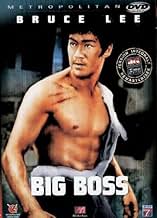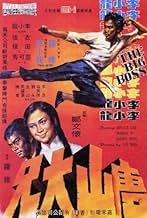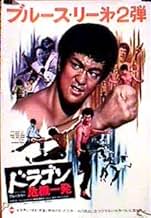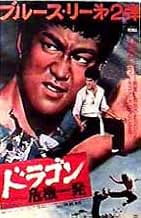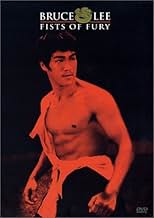IMDb रेटिंग
6.9/10
30 हज़ार
आपकी रेटिंग
अहिंसा की शपथ लेने वाला एक युवक अपने चचेरे भाइयों के साथ एक बर्फ कारखाने में काम करता है जहां वे रहस्यमय तरीके से गायब होने लगते हैं.अहिंसा की शपथ लेने वाला एक युवक अपने चचेरे भाइयों के साथ एक बर्फ कारखाने में काम करता है जहां वे रहस्यमय तरीके से गायब होने लगते हैं.अहिंसा की शपथ लेने वाला एक युवक अपने चचेरे भाइयों के साथ एक बर्फ कारखाने में काम करता है जहां वे रहस्यमय तरीके से गायब होने लगते हैं.
Marilyn Bautista
- Miss Wuman
- (as Malalene)
Nora Miao
- Drinkstand owner
- (as Mao Ke-hsiu)
Chia-Chen Tu
- Uncle
- (as Chia-Cheng Tu)
Billy Chan
- Ah Pei
- (as Hui-yi Chen)
कहानी
क्या आपको पता है
- ट्रिवियाWhen the film was first screened in Hong Kong, a stunned silence followed it for a few seconds that was followed by complete uproar. Bruce Lee was mobbed as he tried to leave the theatre. However in the fictionalized biopic Dragon: The Bruce Lee Story (1993), this event was instead changed from the Hong Kong audience being from an angry mob to a standing ovation crowd.
- गूफ़When the guard dogs leap at Cheng, they are obviously thrown.
- भाव
Cheng Chao-an: Just keep away. Go on. It's not your fight.
- इसके अलावा अन्य वर्जनWhen the film was released in the United States, the death of Hsiao Mi, "The Boss", was cut down to him simply being stabbed in the chest with a knife in order to receive an "R" rating. The original version of his death, which not only shows an explicit close-up of the knife in his chest but Cheng Chao-an's fingers piercing his rib cage and blood flowing from under his shirt, would have given the film an "X" rating. This scene has since been restored for the Bruce Lee Ultimate Collection DVD released by Fox, and the Shout Factory DVD/Bluray releases.
- कनेक्शनEdited into Game of Death (1978)
फीचर्ड रिव्यू
After trying to make a name in Hollywood with the TV series "Green Hornet" with mixed results, young actor and martial artist Bruce Lee traveled back to Hong Kong where his popularity as Kato was very high, there met Raymond Chow and received the chance to star a film about martial arts. "Tang Shan Da Xiong", or "The Big Boss" (known in the U.S. as "Fists of Fury"), was the final result and the movie that started Lee's career and his way to becoming a legend of celluloid.
"The Big Boss" is about a young Chinese man named Cheng Chao-an (Bruce Lee) who travels to Thailand looking for a job. Living with his distant cousins, he finds a job in the ice factory where his cousins work and soon he finds a family in them, developing a close friendship with Hsiu Chien (James Tien) and a big affection for Chow Mei (Maria Yi). Although he is a skilled fighter Cheng sworn an Oath of non-violence to his mother, promising that he would not be a get in fights. However, things get complicated when two of his cousins disappear and is discovered that the ice factory has a dark secret. Cheng will have to break his Oath in order to unveil the mystery behind the disappearance of his new family.
Directed by Wei Lo (who would also discover Jackie Chan), "The Big Boss" was a breath of fresh air to martial arts films as it showed a flawed hero in a modern setting. The story (by Wei Lo and Bruce Lee) is very well developed and filled with suspense and action, and in a bold move for an action film, the main character remains almost inactive for the first half as Cheng must avoid violence due to his oath. The film not only launched Lee's career to stratosphere, it influenced his own film-making's style and the way future martial arts movies were done.
Wei Lo's usually restrained style was also influenced by his young actor's abilities, "The Big Boss" can be seen as his transition to a more explosive way of film-making that would be completed in his next Lee's film ("Fist of Fury") and the subsequent Jackie Chan's films. The natural and raw look of the film added to the high dose of graphic violence (it is probably the goriest film in Lee's career) give the movie a harsh, gritty realism that adds to its charm.
As many have already said (and will continue saying without a doubt), Lee was a very charming actor whose presence filled the screen and owned it completely. That statement is proved here as we see him not as a killing machine, but as a common man who just wants to live peacefully, giving us many scenes of Cheng enjoying his new found family and struggling with his own vices. Lee's performance is very natural although one could say that he was basically playing himself. The rest of the cast ranges from average to OK, with James Tien, Quin Lee and Malalene being the best among them. However, it's fair to notice that the poor dubbing, typical of movies of the era makes a bit difficult to judge them fairly.
"The Big Boss" is considered among the weakest of Lee's films and not without a reason. Those accustomed to constant action scenes will feel it is slow due to the film's pacing and the way the story is built. The acting, as written above, is not very good and only Lee and Tien's performances are of constantly quality. And finally, Wei Lo's inclusion of some silly comedic effects feels terribly out of pace in an otherwise dark and gritty action film.
To summarize, "Tang Shan Da Xiong", or "The Big Boss", is a terrific film on its own right, and together with "Fist of Fury" ("The Chinese Connection") and "Enter the Dragon", a basic film to understand Lee's career and the development of martial arts films during the 70s. It may not be a classic as the films mentioned, but this was just the beginning of the legendary Bruce Lee. 7/10
"The Big Boss" is about a young Chinese man named Cheng Chao-an (Bruce Lee) who travels to Thailand looking for a job. Living with his distant cousins, he finds a job in the ice factory where his cousins work and soon he finds a family in them, developing a close friendship with Hsiu Chien (James Tien) and a big affection for Chow Mei (Maria Yi). Although he is a skilled fighter Cheng sworn an Oath of non-violence to his mother, promising that he would not be a get in fights. However, things get complicated when two of his cousins disappear and is discovered that the ice factory has a dark secret. Cheng will have to break his Oath in order to unveil the mystery behind the disappearance of his new family.
Directed by Wei Lo (who would also discover Jackie Chan), "The Big Boss" was a breath of fresh air to martial arts films as it showed a flawed hero in a modern setting. The story (by Wei Lo and Bruce Lee) is very well developed and filled with suspense and action, and in a bold move for an action film, the main character remains almost inactive for the first half as Cheng must avoid violence due to his oath. The film not only launched Lee's career to stratosphere, it influenced his own film-making's style and the way future martial arts movies were done.
Wei Lo's usually restrained style was also influenced by his young actor's abilities, "The Big Boss" can be seen as his transition to a more explosive way of film-making that would be completed in his next Lee's film ("Fist of Fury") and the subsequent Jackie Chan's films. The natural and raw look of the film added to the high dose of graphic violence (it is probably the goriest film in Lee's career) give the movie a harsh, gritty realism that adds to its charm.
As many have already said (and will continue saying without a doubt), Lee was a very charming actor whose presence filled the screen and owned it completely. That statement is proved here as we see him not as a killing machine, but as a common man who just wants to live peacefully, giving us many scenes of Cheng enjoying his new found family and struggling with his own vices. Lee's performance is very natural although one could say that he was basically playing himself. The rest of the cast ranges from average to OK, with James Tien, Quin Lee and Malalene being the best among them. However, it's fair to notice that the poor dubbing, typical of movies of the era makes a bit difficult to judge them fairly.
"The Big Boss" is considered among the weakest of Lee's films and not without a reason. Those accustomed to constant action scenes will feel it is slow due to the film's pacing and the way the story is built. The acting, as written above, is not very good and only Lee and Tien's performances are of constantly quality. And finally, Wei Lo's inclusion of some silly comedic effects feels terribly out of pace in an otherwise dark and gritty action film.
To summarize, "Tang Shan Da Xiong", or "The Big Boss", is a terrific film on its own right, and together with "Fist of Fury" ("The Chinese Connection") and "Enter the Dragon", a basic film to understand Lee's career and the development of martial arts films during the 70s. It may not be a classic as the films mentioned, but this was just the beginning of the legendary Bruce Lee. 7/10
टॉप पसंद
रेटिंग देने के लिए साइन-इन करें और वैयक्तिकृत सुझावों के लिए वॉचलिस्ट करें
- How long is The Big Boss?Alexa द्वारा संचालित
विवरण
बॉक्स ऑफ़िस
- बजट
- $1,00,000(अनुमानित)
इस पेज में योगदान दें
किसी बदलाव का सुझाव दें या अनुपलब्ध कॉन्टेंट जोड़ें




